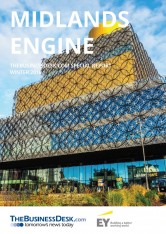Business engagement ‘is crucial’ to Midlands Engine success

TheBusinessDesk.com and EY have produced a Midlands Engine report, assessing the challenges and opportunities facing the region as it looks to maximise the positive impact of devolution. Read the full report here.
BUSINESS rarely speaks with one voice on any issue, but there is unanimity about the foundation stones of the Midlands Engine.
It can’t be left to politicians to sort out and business can’t wait to be invited around the table.
It is already more than a year since the then-Chancellor George Osborne visited the Midlands – naturally making visits to the East and West in fear of being seen to favour one over the other – to launch the Midlands Engine.
Basking in the glow of an unexpected General Election triumph, he sketched the outline of how the Government was going to create the counterweight to the Northern Powerhouse, which has a year’s head start in the Chancellor’s big devolution plan.

“We will support its key strengths in manufacturing, science and energy. We will make major investments to improve transport connections and improve skills. By creating jobs and allowing people to keep more of the money they earn, we will ensure the Midlands shares in a truly national recovery.”
Fast forward little more than a year and Mr Osborne is out of 11 Downing Street, having followed his neighbour David Cameron out of office. But the Midlands Engine concept is only just starting to go through the low gears, as it looks to build momentum.
A week may be a long time in politics, but in economic regeneration terms it is barely a heartbeat.
Despite that there are already murmurings – currently only being expressed in private – asking “what has the Midlands Engine actually achieved?”.
But Sara Fowler, EY’s senior partner in the Midlands and chair of the CBI in the West Midlands, believes now is the time for business to take action.
She said: “I was struck by the potential lack of progress in terms of what the Midlands Engine is saying and doing.
“But at the same time it is quite easy to be critical to stand on the sidelines whereas it’s incumbent on us as business leaders to really begin to look at how we can contribute to this and ask what more can we add collectively.”

“Business engagement has been tokenistic in some areas,” said Chris Hobson, director of policy at East Midlands Chamber of Commerce.”
“The trouble is if you try and engage businesses and you don’t do it meaningfully – or you do it when you’re too early to engage – you go back a second, a third, a fourth time and they are not going to be interested because they have businesses to run.”
This is not a Midlands-only problem, he added, with there being “no blueprint” for business engagement in devolution projects.
He said: “It’s not happened anywhere else. The Northern Powerhouse doesn’t have great business engagement, and I don’t think we should wait for Government to tell us ‘these are the structures, this is the blueprint’ for how business should be engaged.
“We should perhaps as a group of businesses and business leaders be taking it upon ourselves to come forward with structures that go beyond just the Local Enterprise Partnerships. Not that they are not an important player in this but they’re certainly not representative.”









